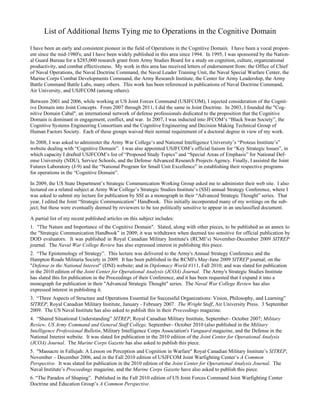List Of Additional Items Tying Me To Operations In The Cognitive Domain
- 1. List of Additional Items Tying me to Operations in the Cognitive Domain I have been an early and consistent pioneer in the field of Operations in the Cognitive Domain. I have been a vocal propon- ent since the mid-1980's; and I have been widely published in this area since 1994. In 1995, I was sponsored by the Nation- al Guard Bureau for a $285,000 research grant from Army Studies Board for a study on cognition, culture, organizational productivity, and combat effectiveness. My work in this area has received letters of endorsement from: the Office of Chief of Naval Operations, the Naval Doctrine Command, the Naval Leader Training Unit, the Naval Special Warfare Center, the Marine Corps Combat Developments Command, the Army Research Institute, the Center for Army Leadership, the Army Battle Command Battle Labs, many others. This work has been referenced in publications of Naval Doctrine Command, Air University, and USJFCOM (among others). Between 2001 and 2006, while working at US Joint Forces Command (USJFCOM), I injected consideration of the Cognit- ive Domain into Joint Concepts. From 2007 through 2011, I did the same in Joint Doctrine. In 2003, I founded the "Cog- nitive Domain Cabal", an international network of defense professionals dedicated to the proposition that the Cognitive Domain is dominant in engagement, conflict, and war. In 2007, I was inducted into JFCOMŌĆÖs ŌĆ£Black Swan SocietyŌĆØ, the Cognitive Systems Engineering Consortium and the Cognitive Engineering and Decision Making Technical Group of Human Factors Society. Each of these groups waived their normal requirement of a doctoral degree in view of my work. In 2008, I was asked to administer the Army War CollegeŌĆÖs and National Intelligence UniversityŌĆÖs ŌĆ£Proteus InstituteŌĆÖsŌĆØ website dealing with ŌĆ£Cognitive DomainŌĆØ. I was also appointed USJFCOMŌĆÖs official liaison for ŌĆ£Key Strategic IssuesŌĆØ, in which capacity I drafted USJFCOMŌĆÖs list of ŌĆ£Proposed Study TopicsŌĆØ and ŌĆ£Special Areas of EmphasisŌĆØ for National Def- ense University (NDU), Service Schools, and the Defense Advanced Research Projects Agency. Finally, I assisted the Joint Futures Laboratory (J-9) and the ŌĆ£National Program for Small Unit ExcellenceŌĆØ in establishing their respective programs for operations in the ŌĆ£Cognitive DomainŌĆØ. In 2009, the US State DepartmentŌĆÖs Strategic Communication Working Group asked me to administer their web site. I also lectured on a related subject at Army War CollegeŌĆÖs Strategic Studies InstituteŌĆÖs (SSI) annual Strategy Conference, where I was asked to submit my lecture for publication by SSI as a monograph in their ŌĆ£Advanced Strategic ThoughtŌĆØ series. That year, I edited the Joint ŌĆ£Strategic CommunicationŌĆØ Handbook. This initially incorporated many of my writings on the sub- ject; but these were eventually deemed by reviewers to be too politically sensitive to appear in an unclassified document. A partial list of my recent published articles on this subject includes: 1. "The Nature and Importance of the Cognitive Domain". Slated, along with other pieces, to be published as an annex to the "Strategic Communication HandbookŌĆØ in 2009; it was withdrawn when deemed too sensitive for official publication by DOD evaluators. It was published in Royal Canadian Military Institute's (RCMIŌĆÖs) November-December 2009 SITREP journal. The Naval War College Review has also expressed interest in publishing this piece. 2. ŌĆ£The Epistemology of StrategyŌĆØ. This lecture was delivered to the Army's Annual Strategy Conference and the Hampton Roads Militaria Society in 2009. It has been published in the RCMI's May-June 2009 SITREP journal; on the "Defense in the National Interest" (DNI) website; and in Diplomacy World #111, Fall 2010; and was slated for publication in the 2010 edition of the Joint Center for Operational Analysis (JCOA) Journal. The Army's Strategic Studies Institute has slated this for publication in the Proceedings of their Conference, and it has been requested that I expand it into a monograph for publication in their "Advanced Strategic Thought" series. The Naval War College Review has also expressed interest in publishing it. 3. ŌĆ£Three Aspects of Structure and Operations Essential for Successful Organizations: Vision, Philosophy, and LearningŌĆØ SITREP, Royal Canadian Military Institute, January - February 2007. The Wright Stuff, Air University Press. 3 September 2009. The US Naval Institute has also asked to publish this in their Proceedings magazine. 4. ŌĆ£Shared Situational UnderstandingŌĆØ SITREP, Royal Canadian Military Institute, SeptemberŌĆō October 2007; Military Review, US Army Command and General Staff College, SeptemberŌĆō October 2010 (also published in the Military Intelligence Professional Bulletin, Military Intelligence Corps Association's Vanguard magazine, and the Defense in the National Interest website. It was slated for publication in the 2010 edition of the Joint Center for Operational Analysis (JCOA) Journal. The Marine Corps Gazette has also asked to publish this piece. 5. "Massacre in Fallujah: A Lesson on Perception and Cognition in Warfare" Royal Canadian Military InstituteŌĆÖs SITREP, November ŌĆō December 2006, and in the Fall 2010 edition of USJFCOM Joint Warfighting CenterŌĆÖs A Common Perspective. It was slated for publication in the 2010 edition of the Joint Center for Operational Analysis Journal. The Naval InstituteŌĆÖs Proceedings magazine, and the Marine Corps Gazette have also asked to publish this piece. 6. ŌĆ£The Paradox of ShapingŌĆØ. Published in the Fall 2010 edition of US Joint Forces Command Joint Warfighting Center Doctrine and Education GroupŌĆÖs A Common Perspective.
